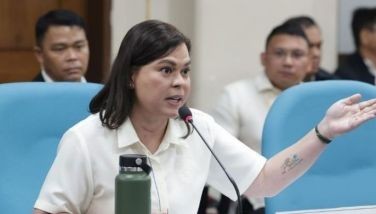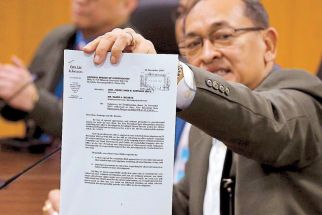DFA: RP won’t resort to forced evacuation in Iraq
June 27, 2005 | 12:00am
Filipinos in Iraq will not be forcibly evacuated, but will be asked to submit to voluntary repatriation, the Department of Foreign Affairs (DFA) said yesterday.
Foreign Affairs Undersecretary for Special Concerns Rafael Seguis, who led the team that negotiated for the freedom of hostage Roberto Tarongoy, asked some 6,000 Filipinos in Iraq to avail of the government’s voluntary repatriation program.
"We should insist on the implementation of the deployment ban," he said. "But I don’t think there’ll be forced evacuation in Iraq."
Meanwhile, Ambassador Roy Cimatu, head of the Middle East Preparedness Team, said a Filipino who wants to return home will be repatriated at government expense.
"We do not force them," he said. "It is the worker’s judgment to stay or leave, but we still have to assist them."
Any Filipino who wishes to be repatriated can contact the Philippine embassy in Baghdad, he added.
However, Cimatu said Filipinos in Iraq, who are mostly working in US military camps, have been discouraged from going to the Philippine Embassy in Baghdad because of the dangerous situation on the streets.
"We discourage Filipinos inside Baghdad proper not to go to the embassy because moving around Baghdad is very dangerous," he said.
"If they could communicate with the embassy through e-mail, better. They (embassy officials) will just go to the camps."
Cimatu said the "lightning" attacks against US and Iraqi troops could escalate to neighboring countries like Jordan and Saudi Arabia and could endanger the lives of Filipinos in the Middle East.
"Assuming that insurgency will subside, the militants will continue their resistance including going out of Iraq and establishing some cells," he said.
"And this is what I am worried about because it might affect the sources of these militants coming from neighboring countries like Jordan and Saudi Arabia where the Filipinos are.
"We are looking into the possible spillover to other countries as far as resistance movement and resistance is concerned."
Seguis, Cimatu and Philippine embassy chargé d’affaires Ricardo Endaya, who were part of the negotiating team for the release of Tarongoy, said they will recommend to the government the continued ban of the deployment of Filipinos in Iraq.
The security situation in Iraq has deteriorated again, they said.
"And this deterioration is brought about by massive military operations. The militants also accelerated their counter-operations against the government to derail the stability of the government.
"It is really in the up trend as far as violence is concerned. This is the situation now."
Foreign Affairs Undersecretary for Special Concerns Rafael Seguis, who led the team that negotiated for the freedom of hostage Roberto Tarongoy, asked some 6,000 Filipinos in Iraq to avail of the government’s voluntary repatriation program.
"We should insist on the implementation of the deployment ban," he said. "But I don’t think there’ll be forced evacuation in Iraq."
Meanwhile, Ambassador Roy Cimatu, head of the Middle East Preparedness Team, said a Filipino who wants to return home will be repatriated at government expense.
"We do not force them," he said. "It is the worker’s judgment to stay or leave, but we still have to assist them."
Any Filipino who wishes to be repatriated can contact the Philippine embassy in Baghdad, he added.
However, Cimatu said Filipinos in Iraq, who are mostly working in US military camps, have been discouraged from going to the Philippine Embassy in Baghdad because of the dangerous situation on the streets.
"We discourage Filipinos inside Baghdad proper not to go to the embassy because moving around Baghdad is very dangerous," he said.
"If they could communicate with the embassy through e-mail, better. They (embassy officials) will just go to the camps."
Cimatu said the "lightning" attacks against US and Iraqi troops could escalate to neighboring countries like Jordan and Saudi Arabia and could endanger the lives of Filipinos in the Middle East.
"Assuming that insurgency will subside, the militants will continue their resistance including going out of Iraq and establishing some cells," he said.
"And this is what I am worried about because it might affect the sources of these militants coming from neighboring countries like Jordan and Saudi Arabia where the Filipinos are.
"We are looking into the possible spillover to other countries as far as resistance movement and resistance is concerned."
Seguis, Cimatu and Philippine embassy chargé d’affaires Ricardo Endaya, who were part of the negotiating team for the release of Tarongoy, said they will recommend to the government the continued ban of the deployment of Filipinos in Iraq.
The security situation in Iraq has deteriorated again, they said.
"And this deterioration is brought about by massive military operations. The militants also accelerated their counter-operations against the government to derail the stability of the government.
"It is really in the up trend as far as violence is concerned. This is the situation now."
BrandSpace Articles
<
>
- Latest
- Trending
Trending
Latest
Trending
Latest
Recommended
November 28, 2024 - 12:00am
November 27, 2024 - 12:00am
November 26, 2024 - 12:00am



























